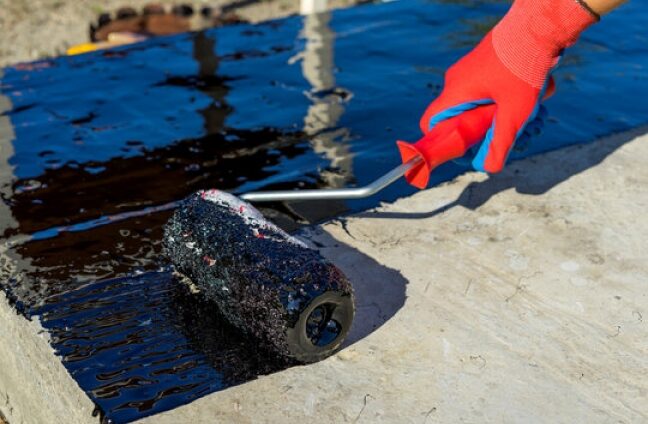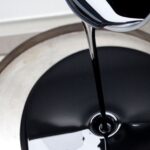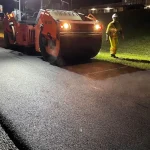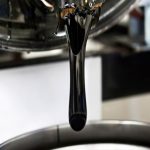
Polymer Modified Bitumen: Its Uses, Industrial Applications
Polymer Modified Bitumen (PMB) is an advanced road construction material engineered by blending conventional bitumen with polymers such as styrene-butadiene-styrene (SBS), ethylene-vinyl-acetate (EVA), or crumb rubber. These polymers enhance the physical and mechanical properties of bitumen, resulting in improved elasticity, durability, and thermal stability.
In this in-depth guide, we’ll explore how PMB is used across various industrial sectors, its performance benefits, application techniques, and how it compares with traditional bitumen. Peak Universal Business as a trusted supplier.
❓ What is Polymer Modified Bitumen (PMB)?
Polymer Modified Bitumen is a composite material that combines standard penetration-grade bitumen with one or more types of polymers to improve its rheological behavior. The modification helps PMB resist deformation, fatigue, cracking, and temperature variations better than unmodified bitumen.
Commonly used polymers in PMB production include:
-
SBS (Styrene-Butadiene-Styrene): Offers elasticity and flexibility.
-
EVA (Ethylene Vinyl Acetate): Enhances strength and stiffness.
-
Crumb Rubber: Derived from recycled tires, adds resilience and environmental benefit.
Types of Polymers Used in PMB
- Styrene-Butadiene-Styrene (SBS): SBS is the most commonly used polymer in PMB. It enhances elasticity, making the bitumen more flexible and resilient to temperature variations.
- Ethylene Vinyl Acetate (EVA): EVA improves the bitumen’s thermal properties, making it more resistant to high temperatures.
- Crumb Rubber: Recycled rubber from tires can be used to modify bitumen, improving its elasticity and resistance to cracking.
- Polypropylene (PP): PP enhances the bitumen’s strength and resistance to deformation under heavy loads.
Production Process of Polymer Modified Bitumen
The production of PMB involves the following steps:
- Bitumen Heating: The base bitumen is heated to a specific temperature to ensure it is in a fluid state for blending.
- Polymer Addition: The chosen polymer is gradually added to the heated bitumen. The proportion of polymer depends on the desired properties of the final product.
- Mixing: The mixture is thoroughly blended to ensure even distribution of the polymer within the bitumen.
- Homogenization: The blend is subjected to high shear mixing to achieve a homogeneous mixture, ensuring consistent performance.
- Cooling: The PMB is cooled to room temperature and stored in containers or transported for use.
Uses of Polymer Modified Bitumen
PMB is used in various applications due to its enhanced properties. Here are some key uses:
1. Road Construction
- Highways and Motorways: PMB is widely used in the construction of highways and motorways due to its excellent durability and resistance to rutting and cracking.
- Airport Runways: The flexibility and strength of PMB make it ideal for airport runways, where heavy aircraft landings require robust pavements.
- Bridges: PMB is used in bridge construction to accommodate the structural movements and resist the environmental stresses bridges endure.
2. Roofing
- Roofing Membranes: PMB is used in roofing membranes, providing superior waterproofing and resistance to weathering and UV radiation.
- Shingles and Tiles: Modified bitumen is also used in the manufacture of roofing shingles and tiles, offering enhanced durability and longevity.
3. Waterproofing
- Basements and Foundations: PMB is applied in waterproofing membranes for basements and foundations, preventing water ingress and structural damage.
- Tunnel Linings: The material is used in tunnel linings to provide effective waterproofing and protection against water seepage.
4. Industrial Flooring
- Factory Floors: PMB is used in industrial flooring applications where high durability and resistance to chemicals and heavy loads are required.
- Parking Decks: The material is ideal for parking decks, providing a durable surface that can withstand vehicular traffic and exposure to the elements.
🏗️ Industrial Applications of Polymer Modified Bitumen
🛣️ Highway and Expressway Construction
PMB is extensively used in high-speed roads, highways, and expressways due to its resistance to rutting, fatigue, and thermal cracking under heavy axle loads and extreme weather conditions.
🛫 Runways and Taxiways
Airports demand a binder that can endure the high-pressure impact of landing aircraft. PMB’s superior resistance to shear stress makes it ideal for runways and taxiways.
🧱 Bridge Deck Waterproofing
Bridges are prone to thermal stress and dynamic loading. PMB helps form waterproof membranes that maintain adhesion and flexibility even in fluctuating temperatures.
🚧 Urban Road Resurfacing
In urban environments with frequent traffic starts and stops, PMB prevents reflective cracking and ensures extended pavement life.
🛤️ Industrial Pavement & Ports
Heavy cargo operations in ports and container yards require binders that withstand static and dynamic loads — PMB performs exceptionally in these demanding settings.
📊 Technical Specifications of Polymer Modified Bitumen
| Property | Typical Value |
|---|---|
| Penetration @25°C (dmm) | 40 – 90 |
| Softening Point (°C) | 60 – 80 |
| Elastic Recovery (%) | > 60 |
| Ductility @25°C (cm) | > 75 |
| Fraass Breaking Point (°C) | < -10 |
| Storage Stability (48 hrs) | < 2.0°C difference |
🔍 Advantages of Using PMB in Industry
-
🔄 Improved Elasticity: Helps pavements recover after load application
-
🌡️ Excellent Temperature Stability: Resists cracking in cold and bleeding in heat
-
🛠️ Extended Pavement Life: Lowers lifecycle maintenance costs
-
🧪 Better Adhesion: Stronger bond with aggregates in asphalt mixtures
-
🌍 Eco-Friendly Options: Crumb rubber modification promotes recycling
PMB offers several advantages over conventional bitumen:
Enhanced Durability: The addition of polymers significantly improves the durability and lifespan of PMB, reducing maintenance costs.
Improved Elasticity: PMB exhibits higher elasticity, allowing it to withstand temperature variations and structural movements without cracking.
Resistance to Deformation: The material’s enhanced strength and resistance to deformation make it ideal for high-traffic areas and heavy-load applications.
Better Adhesion: PMB has superior adhesive properties, ensuring better bonding with aggregates and substrates.
Weather Resistance: The improved weather resistance of PMB makes it suitable for use in extreme climates, providing protection against UV radiation and moisture.
Disadvantages of Polymer Modified Bitumen
Despite its many benefits, PMB has some limitations:
Higher Cost: The production and material costs of PMB are higher than conventional bitumen, which can be a constraint for budget-sensitive projects.
Complex Production Process: The production of PMB requires specialized equipment and expertise, which may not be readily available in all regions.
Compatibility Issues: Not all polymers are compatible with all types of bitumen, requiring careful selection and testing to ensure optimal performance.
Quality Tests for Polymer Modified Bitumen
Ensuring the quality of PMB is crucial for its performance in various applications. Some common quality tests include:
- Penetration Test: Measures the hardness of PMB by assessing the depth a needle penetrates the sample.
- Softening Point Test: Determines the temperature at which PMB softens, indicating its thermal stability.
- Elastic Recovery Test: Assesses the elasticity of PMB by measuring the recovery of a deformed sample.
- Ductility Test: Measures the PMB’s ability to stretch without breaking, indicating its flexibility.
- Viscosity Test: Evaluates the fluidity of PMB at different temperatures, ensuring it meets the required specifications for specific applications.
Environmental Considerations
The production and use of PMB have environmental implications. Efforts are being made to minimize the environmental impact through the following measures:
- Recycling: Using recycled materials, such as crumb rubber, in PMB production reduces waste and environmental footprint.
- Emission Control: Modern production facilities implement emission control technologies to reduce air pollution.
- Sustainable Sourcing: Ensuring that raw materials, such as crude oil and polymers, are sourced from environmentally responsible suppliers.
Future Prospects
The future of PMB looks promising with advancements in technology and increased focus on sustainability:
- Innovative Polymers: Research is ongoing to develop new polymers that enhance the properties of PMB while being more environmentally friendly.
- Green PMB: Development of eco-friendly PMB variants that use sustainable raw materials and have lower carbon footprints.
- Smart Infrastructure: Integration of PMB in smart infrastructure projects, such as self-healing roads and adaptive pavements, to improve performance and reduce maintenance costs.
🔄 Polymer Modified Bitumen vs Conventional Bitumen
| Feature | PMB | Conventional Bitumen |
| Rutting Resistance | High | Moderate |
| Crack Resistance | Excellent | Moderate |
| Flexibility | High | Low |
| Temperature Susceptibility | Low | High |
| Pavement Lifespan | >15 Years | 7–10 Years |
| Maintenance Frequency | Low | High |
Peak Universal Business: As a Polymer Modified Bitumen Supplier
Peak Universal Business is a leading supplier of Polymer Modified Bitumen, offering high-quality products that meet industry standards. Their expertise in sourcing, production, and distribution ensures that clients receive reliable and consistent PMB for their projects. Whether for road construction, roofing, or industrial applications, Peak Universal Business provides tailored solutions to meet specific needs.
❓ FAQ about Polymer Modified
What makes PMB better than standard bitumen?
PMB offers superior elasticity, thermal resistance, and longevity, making it more effective in challenging environments and under heavy traffic conditions.
Which polymer is best for modifying bitumen?
SBS is widely considered the most effective due to its elastic properties, although EVA and crumb rubber are also used depending on the application.
Is PMB more expensive than conventional bitumen?
Yes, PMB has a higher initial cost but provides better value over time through reduced maintenance and extended pavement life.
Can PMB be used in cold climates?
Yes, PMB formulations can be customized to perform exceptionally in cold regions by lowering the Fraass Breaking Point.
Is Polymer Modified Bitumen environmentally friendly?
Yes, especially when modified with recycled materials like crumb rubber, PMB contributes to sustainability in road construction.
🧾 Conclusion- Applications of Polymer Modified Bitumen
Polymer Modified Bitumen represents a technological evolution in bituminous binders. With unmatched performance in both hot and cold climates, PMB is the binder of choice for demanding industrial infrastructure projects. Its resistance to deformation, superior bonding with aggregates, and extended lifecycle performance make it a valuable material in modern civil engineering.
You can Read More about Polymer Modified Here:
Sustainable Environment with Polymer Modified Bitumen
Polymer Modified Bitumen: Its uses, Applications & Benefits
Polymer Modified Bitumen: Its Uses and Applications
📣Call to Peak Universal Business
📞 Looking for a reliable supplier of Polymer Modified Bitumen for your infrastructure project?
Peak Universal Business as a trusted supplier.
📌 Get in touch for:
-
📄 Technical Specification Sheets
-
🛢️ Bulk Delivery Options
-
🏗️ Project Consultation with Asphalt Experts
🔹 Request a Quote | 🔹 Download TDS | 🔹 Talk to a Bitumen Specialist
📧 Email: [email protected]
📞 Phone: +971 4 878 2031
🌐 Visit: PUBLtd. Bitumens
If You have any other Query or Question you want to ask, Please don’t hesitate to Contact Us.
- 0 comment





Leave a Reply